Between the dates of birth and death, of graduation, practice, distinction and retirement, between all the known markers of progression through life runs a current of turbulent energy, the animating force of character. It is in this stream that the real man resides. It is indefinable, unmeasurable, and in anyone worthwhile knowing it is intense, contrary, paradoxical, strongly marked, and mysterious. If this be spirit or soul then let it be. It is unimaginable that it has passed.
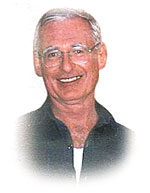 It is impossible to fix and hold this energy, but only to describe its qualities, to say how we have experienced it and thus to communicate in an imperfect way what it is. It is the mercury of human character, and if this isn’t true for ordinary men, then it is for Peter McHugh.
It is impossible to fix and hold this energy, but only to describe its qualities, to say how we have experienced it and thus to communicate in an imperfect way what it is. It is the mercury of human character, and if this isn’t true for ordinary men, then it is for Peter McHugh.
He was an unusual man, given to strong opinions, and the possessor of unusual, sometime uncomfortable, qualities. That is why his friends loved him.
He was for example wonderfully, humourously, often unjustly scornful. You don’t see much of that anymore, the ability and the sheer confidence to sweep away any regard for received opinion and the conventional pieties. And after a moment of shock, you realized he was right. It was not, of course, the way to preferment.
At the same time he was deeply sympathetic. No one attracted him more than a battler, or someone who had been injured emotionally or physically. Above all those worn away by time, debility, and events found a champion in McHugh. He always preferred such people as clients, finding them more wholesome and interesting than the powerful or people with money.
And it was only in McHugh that I came to know that, from time to time, the best response to the soiled world is a lofty contempt.
With these go qualities often claimed for others but quietly possessed by McHugh: courage, rectitude, and generosity. He had them in abundance, though as a contrarian he tried hard to conceal them.
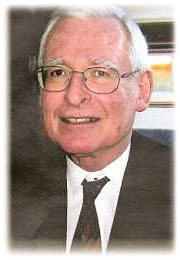 He was a man with a talent for friendship, and with the ability to sustain friendship across the decades, even with people with whom he had quarreled. It must be that, simply, he was worth knowing; that his unusual combination of qualities made him vital and interesting. He had the rare ability, unless you displeased him, of making you feel interesting. He didn’t, as so many clever people do, use conversation to project his own personality.
He is mourned by friends from school who knew him nearly half a century ago; recent friends grieve too.
He was a man with a talent for friendship, and with the ability to sustain friendship across the decades, even with people with whom he had quarreled. It must be that, simply, he was worth knowing; that his unusual combination of qualities made him vital and interesting. He had the rare ability, unless you displeased him, of making you feel interesting. He didn’t, as so many clever people do, use conversation to project his own personality.
He is mourned by friends from school who knew him nearly half a century ago; recent friends grieve too.
McHugh knew what mattered. That is why he was known in chambers, and more widely, as The Lord of Lunch.
As if by right Peter would come to be seated in the dominant position at any restaurant table; that is, able to converse both right and left, to get the view, see the room, and summon staff for food and drink. To baffled waitresses he would quote lines from 60’s songs, and to nervous drink waiters he would issue obscure commands like:
“Fire at will”, meaning, thank you, everyone will have a drink.
“Take no prisoners”, which I think meant the same thing.
“Can’t fly on one wing”, which didn’t just mean “have a second drink”. It meant, logically, “Have an even number of drinks” – two, four, six and on.
Then, at the end of lunch (which in the 80’s was often the beginning of dinner) he would with an imperious sweep of the arm gesture to the wreckage of plates and glasses before him, saying “Liberate me”, and reward the young man or woman with a generous “sling”, which he would make sure, by interrogation, went into their pockets, and not to the employer.
Peter, fastidious in everything, was a vegetarian, and his way of telling staff of that fact, particularly in Chinese restaurants was to utter a warning, together with a wave of an index finger. “ No dog”, he would say. We were in Sydney and McHugh had his say at the Ming Dynasty. But the waiter thought it was a question, apologised that they had no dog, but offered that, if we were prepared to wait, they might be able to rustle up a puppy. We didn’t.
I last saw him in life not a week ago, at the head of a table. There was wine, cake, fellowship, and McHugh, conducting.
Peter was very well informed. He had become devoted in youth to ABC Radio National, that well known font of left wing bias and communist propaganda, and that, with a variety of newspapers, kept him up to date with world affairs. He was thus interesting to engage on political questions, on matters of religion, finance and the taxation of barristers; all the things in fact that polite society avoids. He would know, at any given time, details of Middle Eastern policy shifts, the identity of the new French Minister of Culture, the history of Polish border disputes with East Prussia.
It was a real pleasure to be compelled to agree with McHugh on everything. After all he had the facts, he had the sources. And it was all tempered with a sly self-deprecatingness, when he laughed at his own conspiracy theories, and left you defending a position he had led you to, which he had quietly abandoned.
Above all, in his investigation of the behaviour of the world, there was the opportunity to enjoy outrage, which he generously shared. He, and we, could sustain righteous indignation for weeks after some shabby doing he located in the press.
He was a champion of unpopular opinion, and I think in permanent reaction to the brute ill-manneredness of contemporary life, the grasping and the climbing. He was ill suited to advancement, and it was one of his best qualities.
Peter was a very good lawyer. He had an intuitive ability to see a weakness in argument immediately. It was always wise to describe a legal problem to McHugh before going off to court with it, if he had time. Many times I would stand up later that day, my case fortified by McHugh’s attention. Of course I would get the fee, and the future brief. My debt to him is great.
He had no truck with computers or the internet. He didn’t think real scholarship could be done that way. The mainstay of his research was an annotation of the Queensland Statutes called “ The Grey Binder”, that and The Australian Digest. When these publications ceased something went out of McHugh’s practice. I agree with him. These were homely and comfortable things. Electronic law had no attraction for Peter. A simple accumulation of cases he thought no substitute for editorial analysis.
Though a skeptic in many things, and an outright anarchist in others, Peter was scrupulous about the honour and traditions of the profession he had entered. He never misled a colleague or a court, or allowed misunderstanding to stand to his advantage. He was a tough opponent, but courteous and collegiate. He did not suffer fools and he was unforgiving of sharp practice. which is the obligation of us all.
Though he would deny it McHugh was a master of the Australian language. I think in this respect he had the advantage of older parents, whose familiar idiom went back to a more original Australia, with its self reliance, and bush lore.
I learned how to play “cop the crow”, to stick an uninitiated newcomer with an unwanted task, how to “hit the frog and toad” in order to get home, and why, as young Australians now wore baseball caps, there could never be a Third AIF.
He was a museum of old sayings, and the thoughts and attitudes that went with them, which were generally humourous, stoical, and irreverent
McHugh had also accumulated a considerable body of knowledge of the natural world. He could identify all the trees in the shire, and know the quality of their timber, how the tree grew and flowered, and the conditions that it favoured. He kept books to identify birdlife. He had made, as he said, a treaty with the snakes and the other animals at his farm, which both sides honoured.
He consulted almanacs, cyclopedias, guidebooks.
McHugh knew the phases of the moon, and when at his farm you could see by starlight. He kept track of the equinoxes, and the solstices, which had meaning for him, the paths of comets, and the turning star patterns.
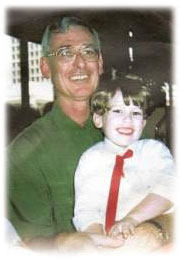 His son Robert was born on the summer solstice, and a full moon rose that night. Peter always spoke of some powerful synchronicity at work there, to be sensed only by adepts and by Irishmen.
His son Robert was born on the summer solstice, and a full moon rose that night. Peter always spoke of some powerful synchronicity at work there, to be sensed only by adepts and by Irishmen.
I think he was a Druid. I owe him a way of hearing, and a way of seeing.
Peter has been blessed by his son Robert and by Sue, Robert’s mother, and by his partner Jenny whose love and loyalty has been inspiring, and to whom we have a great obligation.
At a bend in a creek running from state forest, shaded over by subtropical trees, and on a wedge of hillside with high views to the northeast, McHugh ran a small farm. His mangos were glorious and his macadamias, native to the very area, were perfect. He was rightly proud of what the farm produced, and it was plain that its development was spiritually sustaining.
It is hard to think of evening coming in, with the trickle of the creek, and no lantern now flaring or kettle singing.
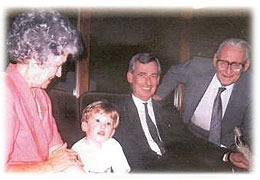 He was, when minded to be, a great host, and one of life’s great pleasures was to call in on him at the farm when he was there. Soon there would be coffee and cake, fruit, roasted nuts, gin, all taken at his long table above the creek. And then we would be into it, the unsatisfactoriness of the world, the substandardness of human beings, the French.
He was, when minded to be, a great host, and one of life’s great pleasures was to call in on him at the farm when he was there. Soon there would be coffee and cake, fruit, roasted nuts, gin, all taken at his long table above the creek. And then we would be into it, the unsatisfactoriness of the world, the substandardness of human beings, the French.
And all the while the creek would sound, and cool breezes would blow in the trees, and bees would hum, and there was blue sky, and scudding clouds, and against that, which he has now joined, none of what we said mattered.
Richard Galloway



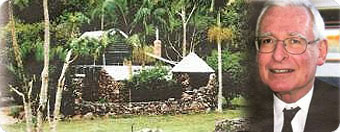
 It is impossible to fix and hold this energy, but only to describe its qualities, to say how we have experienced it and thus to communicate in an imperfect way what it is. It is the mercury of human character, and if this isn’t true for ordinary men, then it is for Peter McHugh.
It is impossible to fix and hold this energy, but only to describe its qualities, to say how we have experienced it and thus to communicate in an imperfect way what it is. It is the mercury of human character, and if this isn’t true for ordinary men, then it is for Peter McHugh. He was a man with a talent for friendship, and with the ability to sustain friendship across the decades, even with people with whom he had quarreled. It must be that, simply, he was worth knowing; that his unusual combination of qualities made him vital and interesting. He had the rare ability, unless you displeased him, of making you feel interesting. He didn’t, as so many clever people do, use conversation to project his own personality.
He is mourned by friends from school who knew him nearly half a century ago; recent friends grieve too.
He was a man with a talent for friendship, and with the ability to sustain friendship across the decades, even with people with whom he had quarreled. It must be that, simply, he was worth knowing; that his unusual combination of qualities made him vital and interesting. He had the rare ability, unless you displeased him, of making you feel interesting. He didn’t, as so many clever people do, use conversation to project his own personality.
He is mourned by friends from school who knew him nearly half a century ago; recent friends grieve too. His son Robert was born on the summer solstice, and a full moon rose that night. Peter always spoke of some powerful synchronicity at work there, to be sensed only by adepts and by Irishmen.
His son Robert was born on the summer solstice, and a full moon rose that night. Peter always spoke of some powerful synchronicity at work there, to be sensed only by adepts and by Irishmen. He was, when minded to be, a great host, and one of life’s great pleasures was to call in on him at the farm when he was there. Soon there would be coffee and cake, fruit, roasted nuts, gin, all taken at his long table above the creek. And then we would be into it, the unsatisfactoriness of the world, the substandardness of human beings, the French.
He was, when minded to be, a great host, and one of life’s great pleasures was to call in on him at the farm when he was there. Soon there would be coffee and cake, fruit, roasted nuts, gin, all taken at his long table above the creek. And then we would be into it, the unsatisfactoriness of the world, the substandardness of human beings, the French.